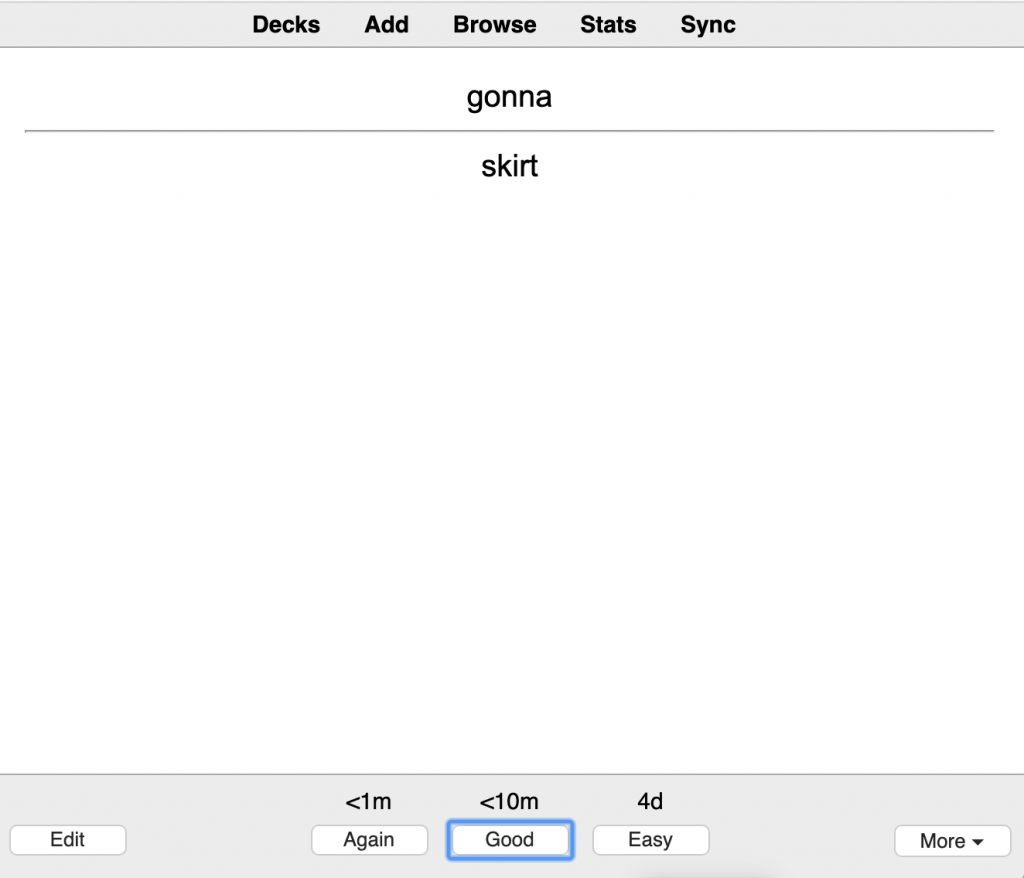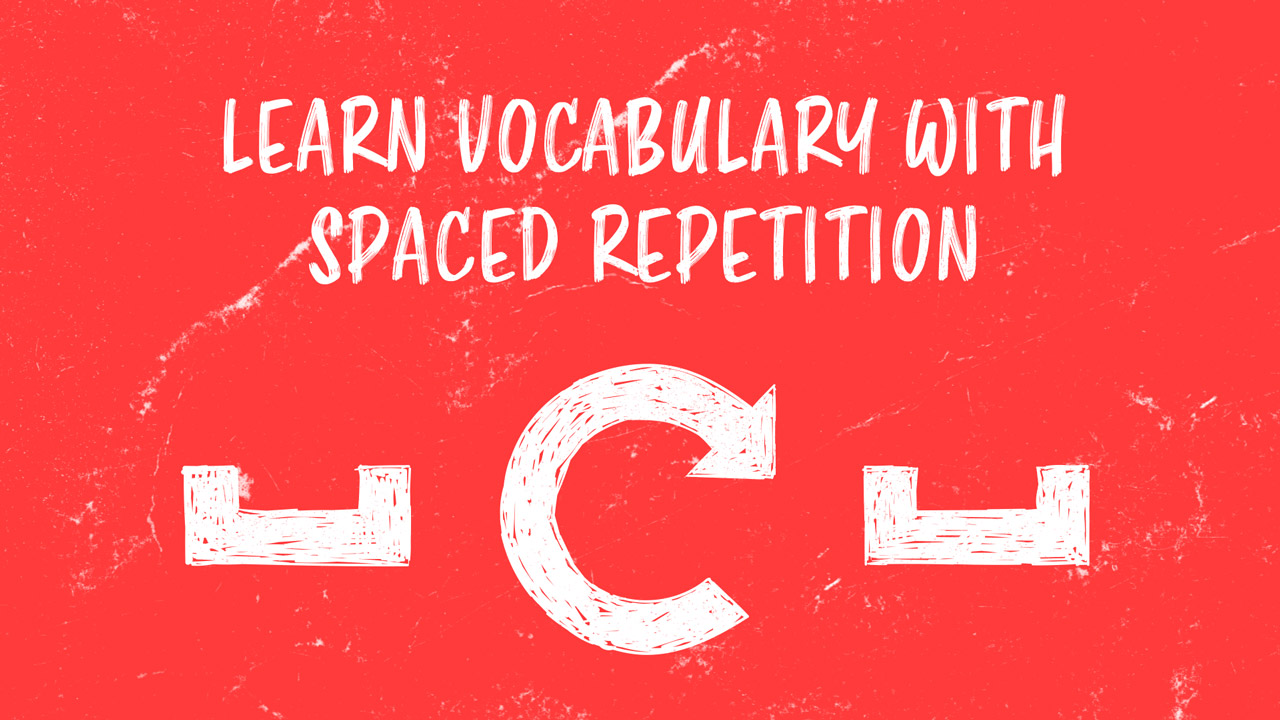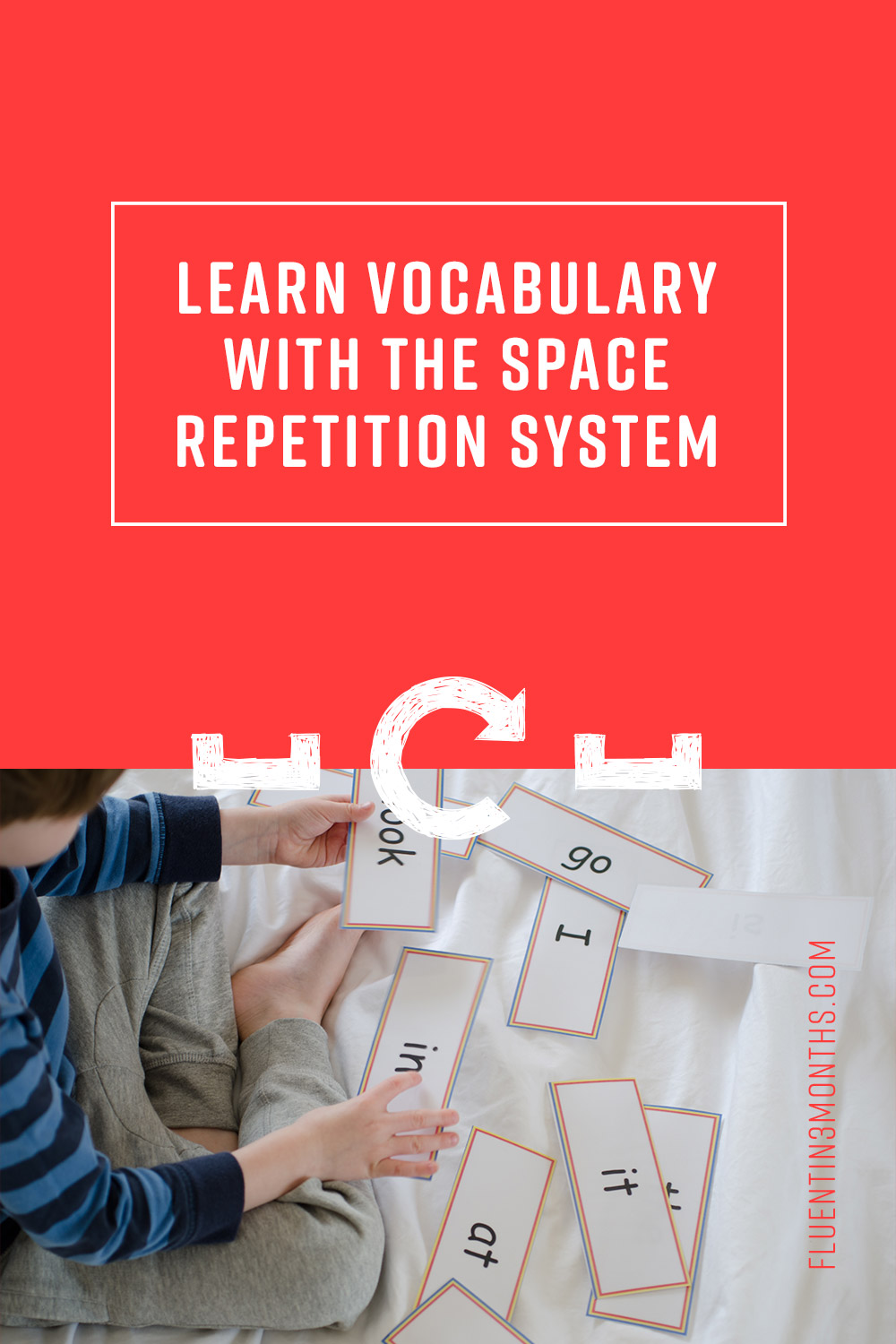Spaced Repetition System: Learn Vocabulary and Never Forget It!
The Space Repetition System (SRS) is a great method to make sure you remember vocabulary so it sticks in your mind!
But what is it?
I'm sure you know the feeling when you have learned a word, and you’re sure of it, but you just can't say it. This may simply be because it's been too long since you reviewed that word.
Using SRS a few minutes a day will solve this problem. If you use it right, SRS makes sure that none of the material you’re learning will ever be neglected.
Since language hacking is my thing, I’ve been using SRS for years now. It’s made my vocabulary much more solid, and I want to help you achieve that too.
In this post, we’ll talk about:
Table of contents
What Is Spaced Repetition
SRS is a presentation method that gives you information before you would forget it. It makes sure that the information stays constantly fresh in your mind.
Here’s a short explanation of how it works: when learning a new word, you’ll first see it very frequently as you go through your review – every few minutes to start. After that, you’ll only see it every few days, then every few weeks, etc. You always check the word at the time you need to see it most. That way, you make sure it is constantly fresh in your mind.
It's a more streamlined version of the flashcard system, where you have a word on one side of a card and its translation on the other. With flashcards, you look at the word and test yourself to see if you know it. To check, you turn over the card to see the translation.
You couldn't get more low-tech than that even if you tried, but SRS uses 21st century technology to make this possible while considering the time dimension.
So how would a guy like me be interested in software for improving recall of vocabulary? I dislike studying indoors and I’m not usually a fan of flashcards. Plus, I already have a pretty good learning strategy.
That’s what we’ll explore in this post.
How to Use the SRS: Find the Time to Study
Like many people, I'm a busy guy!
I'm trying to work, write books, continue improving my language skills, and have a social life. Plus, life makes me busy in many little ways. I have to grocery shop, clean, sleep, eat, write blog posts and emails, exercise, etc.
All of that, every day.
But there are ways to make time. By that, I mean getting it back from the time spent waiting.
Let’s talk about that.
Here are examples of wasted waiting time:
- waiting for the bus/metro/train,
- in the bus/metro/train,
- in the supermarket line,
- in a traffic jam,
- when ordering coffee in the morning,
- waiting for friends to arrive,
- at the doctor's/dentist's,
- in lifts, elevators, at traffic lights,
- when something loads on your computer,
- etc.
In most of these situations you may be alone. So if there’s no one to talk to, what do you do? Stare into space? Read advertisements around you? Twiddle your thumbs?
These little segments of our day fly by unutilised and actually add up to a huge amount of time wasted. And the worst is that you can't avoid these situations: they are natural parts of your day.
For most people, these little segments are annoyances. Why is the other person so late? Why does there have to be so many people ahead of me in the supermarket? Why did my computer have to crash now of all times?
Waiting in frustration is simply what we end up doing. Considering how much time per day we spend doing this, it’s an unneeded source of stress!
But I actually don't mind these occasions!
Seriously. When someone is a little late, or if I just missed the bus and the next one won't come for 15 minutes, I make the most of the time.
Rather than cursing at my “bad luck”, and adding stress to my life by being angry during this time, I think to myself: Great! Another chance to study some vocabulary!!
Improving on the old-school method
For several years, I would take out my phrasebook in these situations. Or I would open up vocabulary books to a random page and learn whatever I saw.
Sometimes I'd see a word I never had before and sometimes I'd see something I needed to review. Other times, it was words I’d long forgotten and needed to relearn rather than just remind myself.
It did the job. But to be honest, in retrospect, this was an inefficient and sloppy method.
(Although, if you learn by listening, these moments are good times to take out your MP3 player and press play on your favourite podcast!)
Systematically going through vocabulary in order like this means that you might not review the hardest words when you need to. It can also make you see the easy words too often or forget words you haven’t reviewed for a while.
SRS answers all of these issues by letting you decide when you should see a word again. This is based on certain criteria, usually how hard you felt it was.
This way, the easy words are pushed way off into the future and the hard ones keep constantly reappearing until you are finally happy with them. Those that you don’t find easy, but don’t find hard either, will reappear just when you’re on the verge of forgetting them, to refresh your memory.
Deciding when to study a word again when you see it in a printed list is too hard. That's where technology comes in!
Use Anki for Spaced Repetition
Anki is an application developed by Damien Elmes for reviewing things you need to learn, using SRS.
It’s not just for vocabulary, but also cities, country capitals, medical terminology, a script for a play, etc.
Anything you need to apply to memory really!
It's a completely free download (or, alternatively, a low-bandwidth website) and works on Windows, Mac and Linux! There are also apps available for smartphones.
How to Use Anki as Your Spaced Repetition Program
Everyone can use Anki for free on their computer, and you can simply decide to give it 30 minutes a day. Make sure to set aside that time every day.
Based on the time-wasting description above, you can guess where I do my studying! On the go! You can see in the picture at the top of the post that I even swiped it out for 2 minute before crossing the road!
Anki’s use is pretty self-explanatory, but here are some videos showing how it works.
The set-up takes a few minutes but then you just have to open the program and use it whenever you want! All the little minutes add up very quickly.
On the surface, the program does more or less what you would expect from a flashcard software. It shows you a word with no translation (either in your native language or in the target language) and you can decide if you know what it means. You then press “Answer” and it will show it to you.
But here’s where it gets a little different.
Here’s what it looks like on a computer screen:

Here’s how it works on the app:
- If you had absolutely no idea what the word meant, press the red button. This sets the word to reappear very soon.
- If you thought the word was super easy, press the blue or green button. These buttons include a distant time factor, depending on how you reacted to the word in previous attempts.
- Otherwise, press the grey button.
I like having 4 levels to decide how “easy” I thought the word was, and I use each one accordingly.
If this all sounds drastically simple, that's because it is!
The most important part of the interface is actually pretty much just that: the algorithm working in the background to decide precisely when to show you the words. You don't really have to think about that though, since the system covers it for you. All you have to do is think about the word and then grade it on difficulty.
Combine SRS and Other Learning Strategies
Despite how obviously enthusiastically I'm sharing this system with you, you must know that it is only one way to acquire new vocabulary.
The best way by far is to hear and apply it in context with native speakers.
Even if you “knew” all the vocabulary in the world, you still wouldn't be able to apply it in actual conversations unless you worked on other important skills related to language learning.
Since you’re usually hearing words in isolation, you have no context. This is quite an artificial way to learn words. You learn simple translations of something from your mother tongue, rather than understanding how to use the word itself.
And you can't learn any language just by learning translations.
Someone using too much SRS would not necessarily be any further along compared to someone using other strategies.
On top of this, just looking at the word is not enough. If you don't think harder while using it, SRS can turn into nothing more than a fancy version of rote learning by repetition.
If you are exposed enough times, you will be forced to remember a word. But what I prefer is to try to make an image association of the word. I also think of an example sentence to use the word in and say that to myself, so that I use it in its right context.
This way I'm much more likely to remember the word next time.
SRS by itself is far from perfect. However, if you use it while thinking independently too, it has a much greater potential.
Another thing to take into account for learning words and avoiding forgetting them is to avoid learning the vocabulary only one way. By one way, I mean foreign language to native language. When people focus on recognition rather than production, they can understand languages, but they are at a loss when the time comes to speak them.
In this case, it's important that you see words appear in SRS for translation to the foreign language too. This is a setting you can choose in your Anki preferences.
When using Anki on a computer, you can acquire single-word vocabulary very quickly if you set aside 30 minutes a day to review words.
And by using Anki in its mobile form, you can take advantage of time that you would otherwise waste!
People also use it for learning scripts such as Kanji, and you can add audio and pictures if you feel that would help!




Social